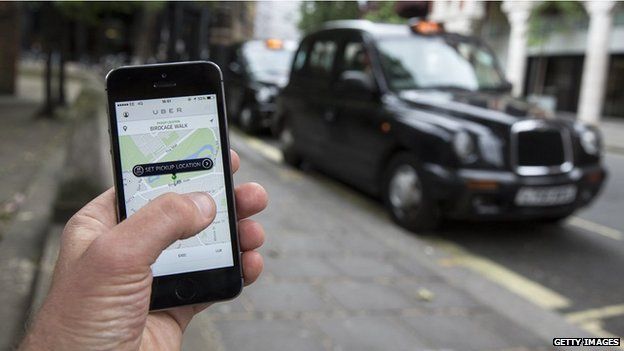Uber given new taxi licence despite hostility
- Published

A taxi-hailing app that has faced fierce and sometimes violent opposition in parts of the world has been given a licence to operate in Nottingham.
The app, called Uber, has angered some traditional taxi drivers, who complain of unfair competition.
Nottingham City Council granted the licence after questioning Uber representatives for two hours.
Uber has not set a launch date but said it was "excited" to bring its service to Nottingham.
"Uber not only enables riders to get about town cost-effectively and safely, it also enables drivers who partner with us to become their own boss and choose when they drive," a statement said.
Get in the cab with an Uber driver and a black-cab driver to hear their views
Uber has been operating in the UK since summer 2012, when it was introduced in London.
Licences have since been granted in Manchester, Leeds, Birmingham, Newcastle, Sheffield and Bristol.
But Uber is facing legal action by the GMB union over claims it is failing to provide basic rights to its drivers.
Black-cab drivers in London have also started a poster campaign against the service.
Tyres were set alight and flares fired at protests in Paris
Last year, thousands of taxi drivers brought part of central London to a standstill in protest, and there have been further demonstrations in Canada, France, Hong Kong, India, South Africa and the US.
The firm has had to provide security to protect its drivers in South Africa after threats from traditional drivers.
Private hire firms argued that Nottingham is "already out of control in terms of taxis in our city centre" and that Uber, an international company, would take money away from the local economy.
Councillor Nick McDonald, Nottingham City Council's portfolio holder transport, said: "The council has a statutory duty to grant an application for an operating licence unless it feels the applicant is not fit for purpose."
- Published31 July 2015
- Published29 July 2015
- Published29 July 2015
- Published9 July 2015
- Published9 June 2014
- Published29 June 2015
- Published28 May 2015
- Published22 May 2015